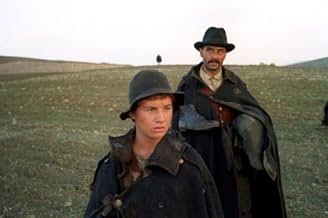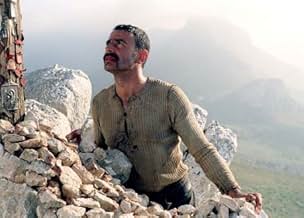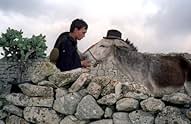Un campesino siciliano comienza el viaje hacia la tierra prometida y conoce a una bella inglesa. Ninguno está preparado para vivir la dura realidad de Ellis Island. ¿Podrán cruzar la puerta ... Leer todoUn campesino siciliano comienza el viaje hacia la tierra prometida y conoce a una bella inglesa. Ninguno está preparado para vivir la dura realidad de Ellis Island. ¿Podrán cruzar la puerta dorada hacia la América de sus sueños?Un campesino siciliano comienza el viaje hacia la tierra prometida y conoce a una bella inglesa. Ninguno está preparado para vivir la dura realidad de Ellis Island. ¿Podrán cruzar la puerta dorada hacia la América de sus sueños?
- Dirección
- Guionista
- Elenco
- Premios
- 22 premios ganados y 29 nominaciones en total
- Il Gatto
- (as Paride Benassai)
- Dottore
- (as Giuseppe Cutino)
- Mangiapane
- (as Massimo La Guardia)
- Dirección
- Guionista
- Todo el elenco y el equipo
- Producción, taquilla y más en IMDbPro
Opiniones destacadas
The film opens in turn of the century Sicily as poverty stricken widower Salvatore Mancuso (Vincenzo Amato) and his brother Angelo (Francesco Casisa) climb a rocky hill to present their tokens to the cross to ask for a sign as to whether they should continue to struggle for existence on the island or go to America, the land of dreams. Mancuso's deaf mute son Pietro (Filippo Pucillo) runs to the top of the hill with postcards he has found with images of America (money growing on trees, fruits and vegetables larger than people, etc), and Salvatore accepts this as the sign that he should move his family to America. After convincing his reluctant mother Fortunata (Aurora Quattrocchi) and his sisters Rita (Federica De Cola) and Rosa (Isabella Ragonese) to make the trip, he sells his only possessions (two donkeys, goats, and rabbits) and the man with the boat arranges their trip, giving the family shoes, appropriate clothing, and instructions to board an ocean liner as third class passengers. As the Mancuso family prepares to board they are asked for a photograph, and as they pose behind a painted set, an Englishwoman Lucy/Luce (Charlotte Gainsbourg) walks into the photo as though she were part of this peasant family. Lucy cannot board the boat for America without male escort.
The voyage begins and Luce in her gentle way identifies with the Mancuso family, finally solidifying her safe passage by proposing to Salvatore to marry her 'for convenience, not for love' when they arrive in America. Through a violent storm and living conditions that are appalling poor, the multitude of third class passengers survive, bond, and eventually arrive at Ellis Island, believing their dream of America has been fulfilled. But everyone must pass harsh physical tests, de-lousing, and even intelligence testing to determine if they can enter America: the officials let them know that America does not want genetically inferior people entering the new world! Each woman must be selected by a man to marry on Ellis Island before they are allowed admission. The manner in which the Mancuso family remains united until a somewhat surprising ending is the closing of the tale.
Few of us understand the strict rules and harsh treatment immigrants face (or at least faced at the turn of the century) on Ellis Island, and if we do we have elected to submerge that information. THE GOLDEN DOOR presents the case for immigrants' struggles in a manner that not only touches our hearts but also challenges our acceptance of current immigration legislation. But all political issues aside, THE GOLDEN DOOR is first and foremost a film of enormous beauty, exquisite photography, deeply felt performances by a huge cast, and a very sensitively written and directed story. The is a film that deserves wide distribution, a movie that is a must see for everyone. Highly recommended. Grady Harp
Now, carrying the magnificent young talents he had for the first time on screen then, he takes the audience into a dark void. A literal plunge into dangerous waters. The subject is migration. In this case, from Italy to the New World (the name of the film). A big deal calling it for its American release "The Golden Door".
The story of a family that leaves everything and risks the rest -that is, their lives, for a dream.
I hate to spoil the show telling the story, so I'll dwell a bit in the work Crialese and all his team did so brilliantly.
First of all, choosing to stick to what he knows: direct sound as much as possible. This means, the whole film. The textures, the pain, the nuances of reality are always mingled with the smells, the heat or the cold, the sweat and the blood, life and death, as vibrantly as it is in real life.
The squeaks of bent metal and grinding wood, the infamous drone of the wind and the ominous sounds of big engines and ship horns are among the points that make this film so involving.
Cinematography is in the hands of a French couturier. The symbolism of light is present from the very first shot (again, almost the very first shot from Respiro) and pervades throughout the film with intimacy and a terrible sense of desperation. The subdued tones and the very gray and grim depictions of people suffering the cramped and filthy boat they sail to hope is mesmerising.
Light is used sparsely, almost to discover every character in the dark. The beauty of every shot, and every scene is accentuated by the period costumes and the perfectly selected physical features of the actors.
Again, as he usually does, Vincenzo Amato is definitely on his own. He plays the father of two sons (the same actors who were fifteen and twelve and now are nineteen and sixteen) with all the power he always conveys to his very complex characters.
Charlotte Gainsbourg is so-so. I guess she's never achieved again the perfection she reached in The Cement Garden and in her very first film: L'Effrontée.
Maybe it's just that she seems a bit awkward in her role.
The locations and sets are harsh and compelling, almost playing a character on their own.
Maybe the most remarkable character is the one played by Filippo Pucillo, the mute younger son. The contrast here with his first role is complete. Then, he played a supercharged kid that was as relentless as anything around him. Now, his character is all expression. And just that: no words at all. His eyes tell the whole story with sublime power.
Maybe this is one of those films that will not be very well received in the States. It's absolutely Italian in everything. It's so Italian that most of the time, the language is one of the many dialects that is much older than Italian itself. In the USA this film may be a bit too much for Americans because of the subject. But anyone who remembers the story of their families when they arrived in the States, will see this films with awe.
And, again, the minimalism that goes hand in hand with Crialese's ideas is back with a closing scene in the water. Only this time it goes from underwater photography to aerial.
All in all, another great and very well told story from this filmmaker that only this year (2006) has collected 6 prizes and was nominated for the Golden Lion. Not a small deed!
3 / 5
Therefore, it started a debate about the too much intense flow of immigrants from Romania, generalizing them as criminals, everyone, indiscriminately.
I'm only 15, but I thought: what idea of affluence does Italy give to these poor people? How ever do they regard us as the Land of Plenty? Yesterday evening I finally saw NUOVOMONDO, and my question had an answer. When you have only a donkey and some goats, those propaganda postcards showing United States as a land with milk rivers and huge vegetables, makes such an impression.
NUOVOMONDO is really a must-see film. It balances an ethereal symbolism (milk rivers, glances' play, hard and rocky mountains, the name and character Lucy/Luce) and a cruel realism (the mass of hopeful people on the ship, the procedures at Ellis Island). There's a mixed cast, going from the angelic Charlotte Gainsbourg to the realistic Vincenzo Amato, till a bitter and smashing Aurora Quattrocchi as the mother. But was it really so hard to enter in the New World?
¿Sabías que…?
- TriviaDirector Emanuele Crialese personally chose every one of the 700 extras who appeared in the film. He said he was looking for people who could evoke the same facial expressions of the actual immigrants whose photographs Crialese came across when he was researching the film.
- Citas
Lucy Reed: Madam? Madam. Could you lower your voice? I have a headache.
Fortunata Mancuso: Then have one! What do I care? Who does she think she is? This is the last thing I need. A journey like this ahead and she has a headache.
- Bandas sonorasFeeling good
Words and Music by Leslie Bricusse and Anthony Newley, Adapted and Performed by Nina Simone
Selecciones populares
- How long is Golden Door?Con tecnología de Alexa
Detalles
- Fecha de lanzamiento
- Países de origen
- Sitios oficiales
- Idiomas
- También se conoce como
- Golden Door
- Locaciones de filmación
- Productoras
- Ver más créditos de la compañía en IMDbPro
Taquilla
- Presupuesto
- EUR 10,000,000 (estimado)
- Total en EE. UU. y Canadá
- USD 1,070,769
- Fin de semana de estreno en EE. UU. y Canadá
- USD 27,744
- 27 may 2007
- Total a nivel mundial
- USD 7,228,273
- Tiempo de ejecución1 hora 58 minutos
- Color
- Mezcla de sonido
- Relación de aspecto
- 2.35 : 1
Contribuir a esta página






























